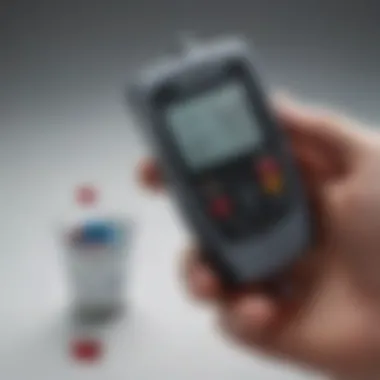Understanding Medicare Coverage for Glucometers


Intro
For those managing diabetes, understanding the ins and outs of Medicare coverage for glucometers can feel like trying to find a needle in a haystack. It’s not just about what devices are available; it’s also about knowing your rights, eligibility, and how to navigate the bureaucratic maze that comes with insurance. This article will unravel the complexities, allowing you to make informed decisions about your diabetes management tools.
Medicare can be a lifeline for many, especially when it comes to covering essential medical equipment like glucometers. With various devices on the market, each tailored for different uses and preferences, it’s crucial to ensure you’re getting the right coverage. The intent here is simple: empower you to take control of your health while keeping potential costs in check. Let’s start by laying a solid foundation for understanding what lies ahead.
Understanding Glucometers
Understanding glucometers is fundamental to managing diabetes effectively. These devices are not just tools; they represent a lifeline for those who navigate the complexities of glucose monitoring. They provide reliable readings that help individuals adjust their diet, medication, and physical activity accordingly. In essence, a glucometer simplifies what can often be a challenging path.
What is a Glucometer?
A glucometer is a small, portable device used to measure the concentration of glucose in the blood. Typically, one would prick a fingertip to draw a small drop of blood, which is then placed on a test strip inserted into the device. Within seconds, the glucometer provides a reading that reflects the blood sugar level.
The role of a glucometer extends beyond mere functionality; it embodies the empowerment of individuals taking charge of their health. This device provides insights that are key in avoiding complications associated with diabetes, such as neuropathy or cardiovascular disease.
Aside from traditional handheld devices, many newer models incorporate advanced features like Bluetooth connectivity, allowing users to sync readings to their smartphones for a more comprehensive view of their health data. This integration of technology enhances convenience and encourages better management practices.
The Importance of Continuous Monitoring
Continuous monitoring of blood glucose levels is crucial for anyone living with diabetes. Fluctuations in blood sugar can lead to severe consequences if left unchecked. By regularly monitoring glucose levels, individuals can develop a clearer understanding of how their lifestyle choices impact their diabetes management.
Consider these points:
- Timely Information: Knowing the current glucose level helps individuals decide if they need to eat, exercise, or take medication.
- Preventative Measures: Early detection of abnormal readings aids in taking preventive steps, reducing the risk of emergencies that require immediate intervention.
- Data Tracking: Consistent use of glucometers allows for better tracking of health trends, which can lead to more informed discussions with healthcare providers.
"Regular glucose monitoring can save your life; it’s a simple step that leads to profound outcomes."
Overview of Medicare
Understanding Medicare is crucial when it comes to managing diabetes and utilizing the right health tools like glucometers. Medicare is a federal health insurance program primarily for individuals aged 65 and older, but it also covers under-65s with certain disabilities. The provisions of Medicare can significantly ease financial burdens for individuals dealing with chronic conditions such as diabetes. With proper guidance, beneficiaries can navigate through the maze of coverage options to access the supplies they need for effective management.
What is Medicare and Who is Eligible?
Medicare is a health insurance program that comprises several services designed to assist those who qualify. Eligibility often hinges on age, but it also encompasses certain medical conditions and disabilities. For someone diagnosed with diabetes, knowing whether you qualify for Medicare can impact your access to necessary supplies like glucometers.
To be eligible, individuals usually must:
- Be 65 years or older
- Have been receiving Social Security Disability Insurance for at least 24 months
- Be diagnosed with End-Stage Renal Disease (ESRD) or Amyotrophic Lateral Sclerosis (ALS)
With millions of Americans relying on Medicare for their healthcare, understanding this program becomes imperative for successful diabetic management.
Program Parts Relevant to Diabetes Supplies
Medicare consists of different parts—each addressing various healthcare needs. For those interested in diabetes supplies, Parts A, B, and D are particularly relevant:
Part A


Part A generally covers hospital insurance and provides benefits for inpatient hospital stays. While it might not directly cover glucometers, it plays a role in the initial care for diabetes complications. It’s significant due to its comprehensive coverage that often includes medically necessary services during hospital admissions.
- Key characterisitc: Covers inpatient hospital services.
- Advantages: Beneficial for long-term care or emergencies related to diabetes.
- Disadvantages: Doesn't directly cover outpatient glucose monitoring supplies.
Part B
Part B covers outpatient care, and this is where glucometer coverage becomes relevant. It usually helps finance doctors' services, preventive care, and necessary medical equipment to manage diabetes.
- Key characteristic: Provides coverage for outpatient medical supplies like glucometers.
- Advantages: Supports better daily diabetes management with covered glucometers and strips under certain conditions.
- Disadvantages: Might require co-pays and doesn’t cover all models of glucometers.
Part
This part handles prescription drug coverage, which can also apply to medications needed for diabetes management. Individuals can select a plan that best caters to their diabetes-related pharmaceutical needs.
- Key characteristic: Offers coverage for essential medications related to diabetes.
- Advantages: Reduces costs for necessary prescriptions.
- Disadvantages: Plans vary widely in coverage and costs, requiring careful selection to maximize benefit.
It’s clear that familiarizing oneself with Medicare and its structure directly aids in making informed decisions regarding diabetes management and the tools necessary for effective glucose monitoring. Understanding these parts is fundamental to utilising benefits for glucometers and related supplies to maintain optimal health.
Medicare Coverage for Glucometers
Understanding the nuances of Medicare coverage for glucometers is key for anyone dealing with diabetes. This specific coverage offers a path to ensuring that necessary tools are accessible, which can have a substantial impact on managing blood sugar levels effectively. As diabetes can be a complex condition requiring vigilant monitoring, knowing how to navigate the available resources can ease some of the burden faced by patients.
Medicare provides coverage for various types of diabetes supplies, including glucometers, which are vital for self-monitoring. This allows individuals to keep tabs on their blood glucose levels and make informed choices about their diet, activities, and medications. Therefore, recognizing the ins and outs of Medicare in this context isn't merely an academic exercise; it's a pressing need for many.
Eligibility Criteria for Glucometer Coverage
To qualify for glucometer coverage under Medicare, there are specific eligibility criteria that must be met. Generally, an individual must be enrolled in Medicare Part B and have a documented diagnosis of diabetes from their healthcare provider. Not all glucometers are created equal; some may be catered more toward specific needs such as precision for those with Type 1 diabetes or simpler devices for those who require basic monitoring.
Key considerations for eligibility include:
- Documented Diabetes Diagnosis: Confirmation from a healthcare provider.
- Age and Enrollment Status: Typically, individuals need to be over 65 or have a qualifying disability.
- Regular Usage Justification: The patient needs to prove the necessity of the device for ongoing care.
Types of Glucometers Covered
Medicare offers coverage for various glucometers, embracing both standard models and advanced options. Generally, the devices that may be covered include:
- Traditional Glucometers: Basic devices that measure glucose levels through blood samples.
- Continuous Glucose Monitors (CGMs): These provide real-time monitoring and may require special approval.
- Alternate Site Testers: These are designed to obtain blood samples from sites other than the fingertip, like the arm or palm.
The choice of glucometer can greatly affect management strategies. For users seeking a touchscreen interface, or features like smartphone connectivity, it’s essential to verify these options fall under covered devices by Medicare or specific plans.
How to Obtain a Covered Glucometer
Navigating how to secure a covered glucometer involves a few essential steps to ensure compliance with Medicare regulations.
Prescription Requirements
Obtaining a glucometer typically starts at the doctor's office, where a prescription is necessary. This prescription must indicate that the glucometer is medically necessary for managing the patient's diabetes.
The essential aspect to note is that a diabetic individual can't just pick any glucometer off the shelf; they need to follow a prescribed route. The benefits of such a requirement essentially provide a shield against misuse or unnecessary financial burdens on the system and helps narrow down which devices are really suited for the patient's needs.


Preferred Providers
Once you have the prescription, the next step is to consider preferred providers. Many times, Medicare may partner with specific suppliers that offer not only competitive pricing but also ensure quicker delivery times.
Utilizing preferred providers is advantageous since:
- Effective Cost Management: Patients can save money on copayments when going through these recognized entities.
- Streamlined Process: It often leads to a more efficient claims process, reducing the hassle and uncertainty involved.
- Specialized Support: These providers might offer additional resources, such as reminders for supplies and assistance in managing one’s health care.
Costs Involved with Glucometer Coverage
Understanding the costs associated with glucometer coverage under Medicare is vital for anyone managing diabetes. Medical expenses can stack up quickly, and awareness of these costs can empower beneficiaries to make informed financial decisions. It's about more than just knowing what's covered; it’s also about grasping how much of that coverage you'll need to shoulder yourself. A comprehensive grasp of your out-of-pocket expenses—like deductibles and copayments—can make a world of difference in how you plan for your healthcare needs, especially when it comes to essential supplies like glucometers.
Deductibles and Copayments
In the Medicare landscape, deductibles and copayments form the cornerstone of understanding costs. A deductible is the amount you must pay before Medicare even starts to pitch in. For instance, if your deductible is $203, you'll foot that bill before your glucometer's costs start becoming reimbursable. It might feel like putting your hand in your pocket before anyone even considers helping out.
Once you've gotten past that initial deductible hurdle, you’ll then deal with copayments. These are fixed fees you'll pay for each covered service or item. For example, if your glucometer is part of a group of services that have a copayment of $15, each time you get supplies, you'll pull out that cash.
A careful selection of providers can ease these costs. Choosing preferred suppliers often results in reduced fees.
Here are a few points to consider about deductibles and copayments for glucometer coverage:
- Check your specific plan: Plans vary, and knowing your deductible and copayment rate is crucial.
- Annual deductible: Be aware that your deductible may reset every year, so plan around that.
- Limit on costs: Some plans may limit how much you pay out-of-pocket for diabetes supplies each year.
Annual Limits and Requalifying
Annual limits are another layer in the intricate web of costs associated with glucometer coverage. Medicare has certain caps on how much it will pay for diabetes management supplies within a calendar year.
If you hit that cap, you might find yourself facing further expenses, because any necessary purchases after that limit won’t be covered. Thus, keeping track of your usage is wise. Similarly, requalifying for coverage can arise at specific intervals—sometimes annually or at program amendments. This may involve demonstrating continued medical necessity, so be prepared to provide documentation if required.
- Monitor usage: Stay diligent about how often you use your glucometer and other supplies.
- Be ready to requalify: Know what documentation or data you might need for the requalification process.
Supplemental Coverage Options
Navigating the intricacies of Medicare coverage can sometimes feel like trying to find a needle in a haystack, especially when it comes to diabetes management. Understanding supplemental coverage options is crucial for individuals looking to enhance their Medicare benefits for glucometer usage. These plans can help alleviate financial burdens associated with glucose monitoring, making it easier for patients to manage their diabetes and maintain their health.
Supplemental coverage can take various forms. The most popular include Medicare Advantage Plans and Medigap Policies. These options are designed to fill in the gaps left by Original Medicare, providing additional coverage that can significantly ease the out-of-pocket expenses for necessary medical supplies like glucometers.
Medicare Advantage Plans
When it comes to Medicare Advantage Plans, these private insurance plans are an alternative to traditional Medicare. They often provide the same benefits as Part A and Part B, sometimes even with additional features like vision and dental coverage. For individuals managing diabetes, this can represent a significant advantage.
Most Medicare Advantage Plans include coverage for glucometers and the corresponding test strips. However, specifics can vary by provider, so it is paramount for beneficiaries to review their plan details. Enrollment usually occurs during specific periods, and some plans might even prioritize certain manufacturers of glucometers, influencing where beneficiaries can obtain their devices and supplies.
Considerations for selecting a Medicare Advantage Plan:
- Network Restrictions: Many plans have a network of doctors and suppliers, which could limit where you can get your glucometer.
- Extra Benefits: Look for added features like wellness programs which can be beneficial in managing diabetes.
- Cost: While some plans may have lower monthly premiums, they could come with higher out-of-pocket costs.
Medigap Policies


On another note, Medigap policies, also known as Medicare Supplement Insurance, are specifically designed to cover costs that Original Medicare does not. This includes deductibles, copayments, and other out-of-pocket expenses—making it a viable option for those who frequently utilize diabetes supplies.
Medigap policies come in various standardized plans, each offering different levels of coverage. A critical point to note is that Medigap policies do not cover prescription drugs, which is essential for some diabetes patients. Therefore, if you lean towards a Medigap policy, it’s wise to also consider enrolling in a separate Part D plan for medication.
Key aspects to remember about Medigap:
- Portability: These policies can often be used with any provider that accepts Medicare.
- Costs: While Medigap policies can reduce expenses, monthly premiums may be higher than those of Medicare Advantage.
- Guaranteed Renewable: Companies must renew these policies as long as premiums are paid, providing peace of mind.
"Navigating Medicare’s landscape becomes easier when you understand the supplemental coverage options available and how they align with your personal health needs."
By exploring both Medicare Advantage Plans and Medigap Policies, beneficiaries can find a solution that suits their lifestyle and budget when it comes to managing diabetes. Knowing these options can empower individuals to make informed choices, thus unlocking optimal health outcomes in their diabetes journey.
Potential Changes in Policy
Emerging Technologies in Diabetes Management
The landscape of diabetes management is ever-evolving. New technologies are developing at a rapid pace. Continuous glucose monitors and smart glucometers are examples of this shift towards more sophisticated machines that offer better tracking and management of blood sugar levels. These advancements can lead to more precise data and optimized health outcomes.
With the introduction of digital health solutions, there’s a push for insurance providers, including Medicare, to adapt their policies. For example, devices that sync with smartphones and apps that track glucose levels are becoming more popular. They not only provide real-time data but also facilitate better communication between patients and healthcare providers.
However, the coverage of these emerging technologies by Medicare is not guaranteed. Beneficiaries need to stay updated on whether new devices will be included in their coverage policies. Additionally, understanding which innovations are considered medically necessary can inform decisions about using more advanced or supplementary devices.
Legislative Changes Affecting Coverage
Healthcare policies are often influenced by new legislation. As lawmakers propose changes that can directly impact beneficiaries, it's essential to keep a pulse on what might ensue. Recent discussions within Congress have revolved around improving access to diabetes management technologies, and some measures may lead to enhanced benefits under Medicare for people with diabetes.
Key legislative changes can address various aspects of coverage:
- Inclusion of New Devices: Laws may expand the range of glucose monitoring devices that Medicare will cover.
- Cost Adjustments: Changes to legislation can also impact the cost-sharing models, potentially lowering out-of-pocket expenses for beneficiaries.
- Streamlining Processes: Legislative efforts may focus on making the process for obtaining necessary equipment more straightforward, reducing the bureaucratic hurdles that patients often face.
Keeping up with these legislative trends is fundamental for understanding how future coverage might evolve.
"As innovations reshape diabetes management, it is necessary for Medicare beneficiaries to equip themselves with information to secure the best possible care."
By recognizing the dynamic nature of policies surrounding glucometers, beneficiaries can make informed choices and better manage their healthcare costs as changes occur.
How to Stay Informed
Staying updated on Medicare coverage for glucometers is not merely a good idea—it's essential. Given the complexities of healthcare policies, particularly regarding diabetes management, knowing where to look for accurate information can greatly impact a person's health outcomes and financial responsibilities. The influx of new devices, continually shifting legislation, and evolving guidelines requires beneficiaries to actively engage in their own education.
The big advantage of being informed lies in reinforcement of personal health management. Understanding one's options means making the right choices when it comes to obtaining the necessary supplies for diabetes management. An informed individual is not just reliant on their medical provider for information but becomes an active participant in their health journey, asking questions and seeking clarity when needed.
Additionally, staying in the loop can help navigate the practicalities of Medicare—like timing for requalifications, renewals, and assessments. Missing critical updates can lead to higher out-of-pocket expenses or unnecessary stress when trying to acquire glucometers. Simply put, knowledge is power, and in managing diabetes, that power can translate into a better quality of life.
Resources for Medicare Beneficiaries
- Official Medicare Website: The first stop for anyone navigating their Medicare options should be medicare.gov. This site offers a plethora of information on coverage specifics, including details on glucometers and necessary supplies.
- Centers for Medicare & Medicaid Services (CMS): Another credible source of official guidelines and updates can be found at cms.gov. They publish detailed information about healthcare policies that can be instrumental for beneficiaries trying to stay informed.
- Local Health Advocacy Groups: Organizations like the American Diabetes Association provide resources tailored specifically to diabetes management. They often have local chapters that can offer personalized assistance and insight.
- Online Communities: Platforms such as Reddit house dedicated forums for individuals managing diabetes. These communities often share real-life experiences and advice regarding glucometer usage, Medicare coverage questions, and more. It's like having several peers in one place to brainstorm issues together.
- Social Media: Engaging with groups on Facebook focused on diabetes management can keep individuals informed about recent updates and changes in policy that might not yet be reflected in official channels.
Consulting Healthcare Professionals
While online resources provide valuable information, one shouldn't overlook the significance of consulting healthcare professionals. Doctors, particularly endocrinologists or diabetes educators, play a pivotal role in guiding patients about their Medicare options regarding glucometers.
- Personalized Insights: Healthcare providers can offer personalized recommendations based on a patient’s specific health status and needs. They might know which glucometer models are covered under Medicare and which ones best suit an individual’s lifestyle.
- Keeping Track of Changes: Since policies can shift over time, maintaining an ongoing relationship with a healthcare professional ensures patients receive up-to-date information that might not be available in other resources.
- Navigating Prescriptions: Gaining access to glucometers under Medicare often requires prescriptions. Healthcare professionals can assist in ensuring prescriptions align with what Medicare considers necessary for coverage.
Ultimately, leveraging both online resources and direct consultations with healthcare professionals provides a well-rounded approach to staying informed. This dual strategy empowers beneficiaries, readying them to face the complexities of Medicare head-on.







